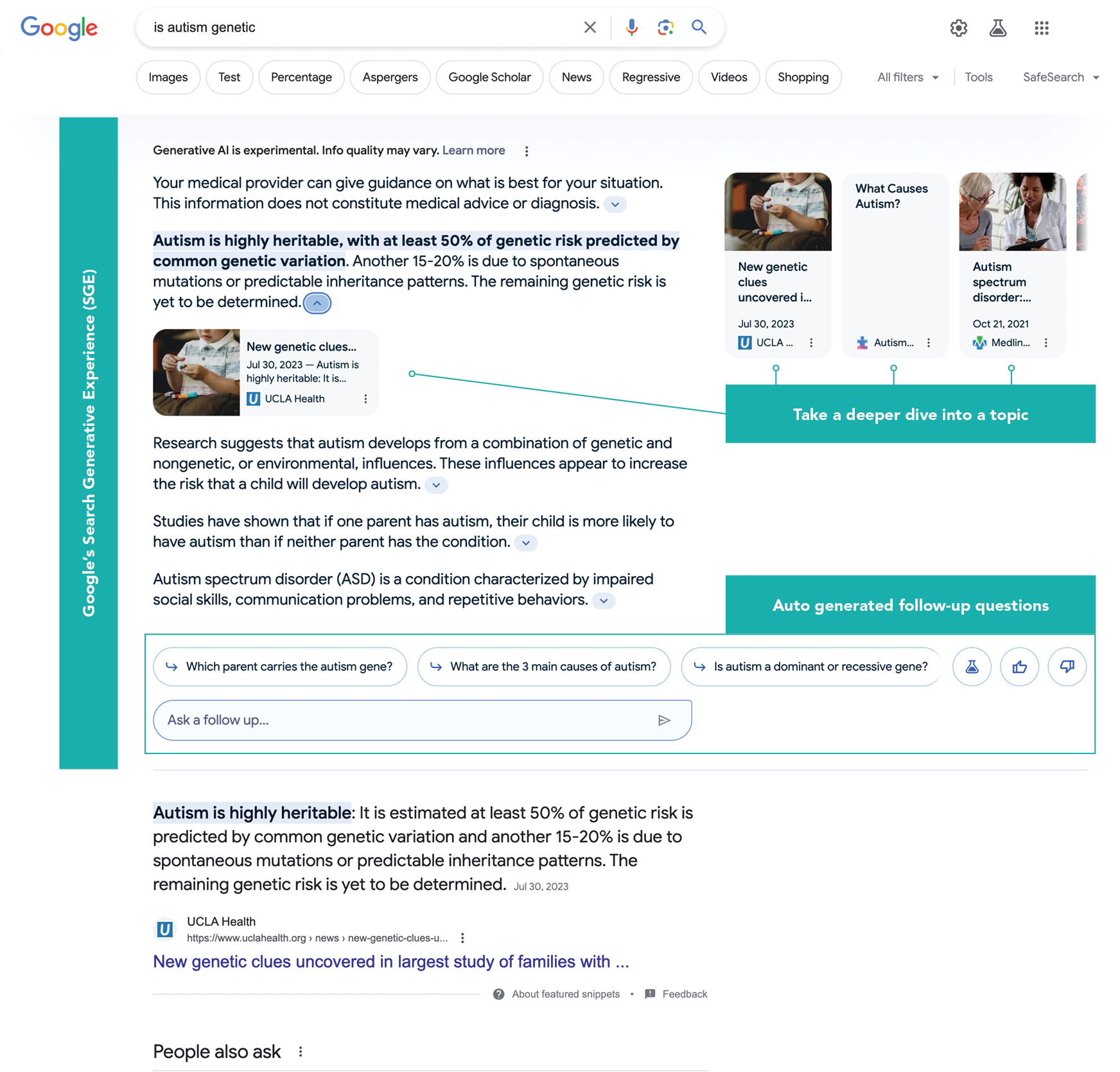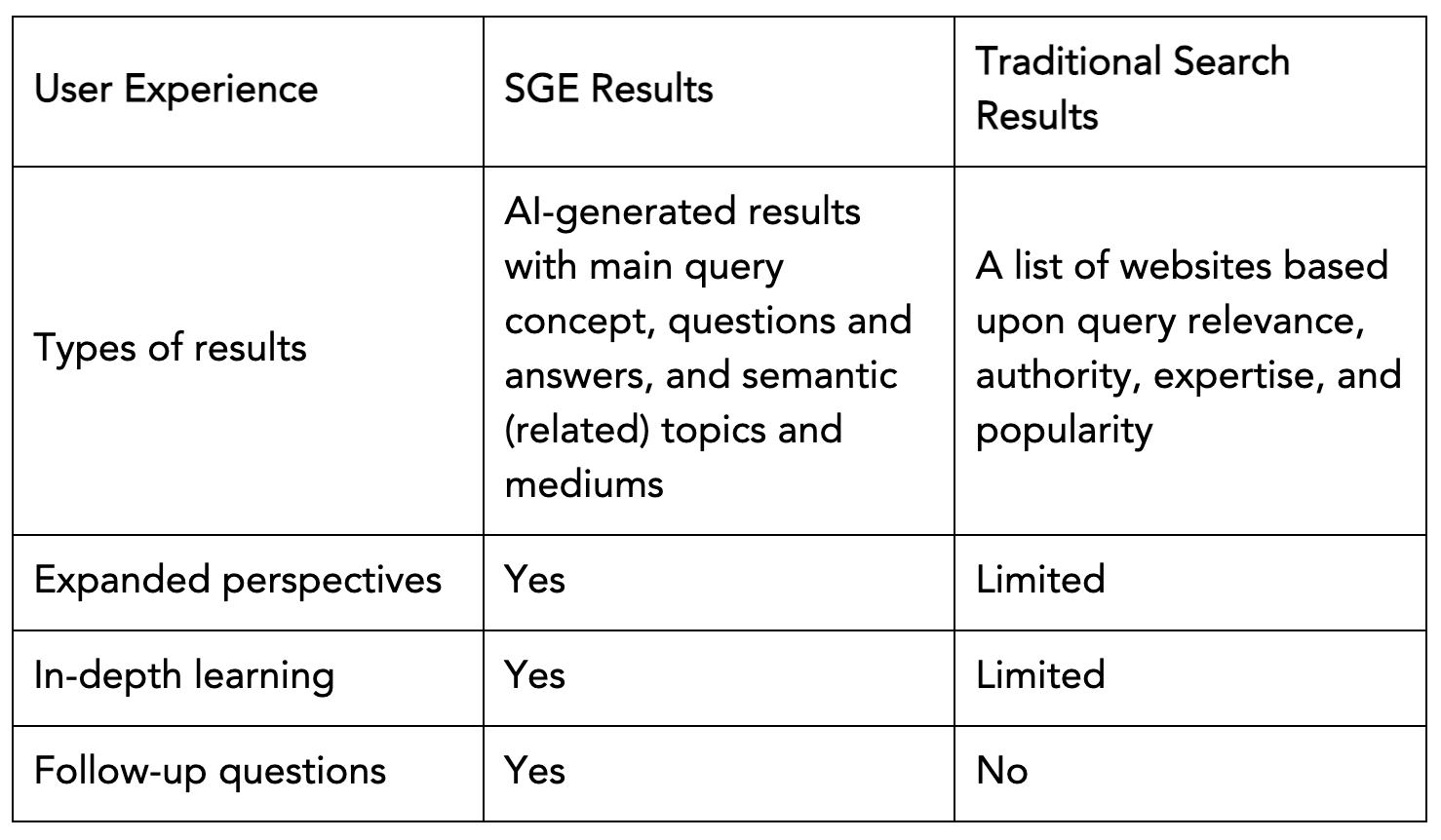Read
Embracing Google’s SGE Search AI
the evolution of SEO

what does AI-powered search mean for your SEO strategy?
Traditionally, SEO professionals have focused on optimizing webpages and content to rank higher in search engine results pages (SERPs). The goal has been to drive organic traffic by enhancing visibility and relevance of the content. However, with the advent of Google’s Search Generative Experience (SGE), the rules of the game are changing.
Google’s search algorithm has already been leveraging AI technology for years to help understand user intent, preferences, search history and interests. AI helps the search engines understand each individual query (keyword search) and deliver personalized results. These results were typically displayed in the form of an organic “list” of webpages on the SERP, with various other features mixed in (featured snippets, local results, shopping results, people also ask, etc.).
Google’s new SGE changes the entire top part of the search results page—the most valuable SERP real estate. It replaces the traditional organic list of results with a more immersive semantic experience of AI-powered query results, questions and answers, and related topics.
While SGE is meant to transform and improve the search experience for users, it poses challenges, implications, and a lot of questions for businesses and how they approach SEO.

understanding the impact of Google SGE
Google has been the forerunner in shaping the web search experience. With the introduction of SGE, the traditional search experience is poised to change drastically. Instead of relying heavily on organic and paid search results, SGE offers answers by combining data from multiple organic search results, turning it into a well-crafted answer without users needing to click links.
This transition is partly influenced by Google’s desire to be a search destination, not just a gateway to other websites—this is proven by the surge in zero-click search results on Google. Users often find answers directly on the results page through rich snippets, FAQs, local listings, and so on. A data point from SEM Rush in late 2022 highlighted that approximately half of Google searches were zero-click, a trend that has been increasing over time.
SGE vs. the traditional search experience
Only 32.9% of position 1–3 search results show in SGE results, where in traditional organic results that would be 100%. So, just occupying search results positions 1–3 is no longer as valuable as it once was.
The traditional search experience involves typing a query into a search engine and receiving a list of results, or SERP (search engine results page). The results are ranked based on a variety of factors, including the relevance of the content to the query, the authority of the websites, and the popularity of the results.

implications for businesses + website owners
Onely research data indicates only 33% of links cited by SGE come from the first three traditional organic results. Insight Partners’ data shows only 57% of SGE result links cited by SGE come from the entire first page of organic results.
For many businesses, this new paradigm can seem a little frightening. It means that even if a site ranks highly in the traditional search results, it might not be prominently featured or even cited in the SGE results at the top of the page. The implications of this shift are significant—we’ll see changing user behaviors, the very real potential of reduced organic search traffic, and even shifts in paid search presentation and dynamics.
However, seeing this change as an end to SEO would be a misconception. SEO is not disappearing; it is evolving.
SEO in the age of search AI
In this new era, SEO strategies will need to pivot. The focus will have to be two-fold: optimizing for traditional search results while also ensuring prominence in SGE’s AI-driven answers.
SEO professionals must be prepared to adapt strategies that align with the changing search dynamics introduced by SGE. By decoding the SGE and other Search AI algorithms, forward-thinking SEOs will be able to navigate and understand these challenges to ensure continued success in driving relevant organic traffic to websites.
Content will always be paramount. However, content creators will need to produce material that not only ranks highly in traditional SERPs, but is also favored by SGE. This means additional emphasis on extensive topic research, creating unique and valuable content, including related/semantic topics, optimizing webpage HMTL structure, and possibly branching out into new media formats.
Early findings on the beta version of Google SGE show there will be a disruption in organic search. How large that disruption is depends upon whether your webpage content is optimized for AI, as well as search engines. Below is the latest research on how often the Google SGE will show at the top of the SERPs, pushing down the organic search results.
At what percentage will industries be affected by the appearance of SGE at the top of the SERPs, pushing down traditional organic search results? Recent research data shows:
- 98% of Local/Visit in person searches
- 96% of Ecommerce/Shopping searches
- 81% of Medical/Healthcare searches
- 73% of News/Time-sensitive searches
- 22% of Finance/Investments searches
Search intent verticals will be impacted differently. Here’s a sampling of search intent and the percentage of SERPs that will have the new SGE results at the top, pushing down traditional organic search results. Recent research data shows:
- Near: ~100%
- Buy: 95%
- Cost: 88%
- How: 77%
- Best: 52%
The above percentages appear to be based on how much confidence, authority and trust Google has in its own search index/database.
benefits of Google SGE and other search AI
While SGE is still in beta, there are some clear benefits of the use of AI in search.
Improved + more personalized search results:
- Generates comprehensive, informative results
- Provides summaries of key points
- Highlights questions that are answered
- Suggests related topics
- Enables users to locate information more quickly and easily
- Personalizes based on user’s search history
- Takes into account user’s location
- Adjusts based on browsing behavior
- Enhances result relevance
- Boosts search efficiency for the user
More engaging + accessible search experience:
- Enables more interactivity during search
- Users can ask follow-up questions within the same page
- Eliminates the need for new searches for related queries
- Furnishes information on a wide range of topics
- Helps in understanding complex topics
- Caters to users with varied levels of literacy and knowledge
putting it all together
The rise of AI-driven search experiences, like Google’s SGE, may feel like uncharted waters for many businesses. However, the essence of SEO—ensuring visibility and relevance in search results—remains unchanged.
With personalized search results becoming the norm, the traditional strategies that focused solely on SERP rankings may prove less effective. SEO efforts like keyword optimization and content creation now need to adapt to cater to the dynamic and personalized nature of SGE.
SGE also opens up opportunities for users to discover new information and perspectives they might not have encountered otherwise. This means SEO professionals need to focus on creating high-quality, engaging content that meets the specific needs and interests of individual users. The emphasis is shifting from appealing to search algorithms to engaging with users directly.
In order to optimize for search AI, we recommend a three-step process:
- Investigate:
Remember, the Google SGE algorithm is different than the traditional organic search algorithm. Research needs to be done in the SGE results to figure out which pages are outranking others in your niche. - Decode and analyze:
Why does SGE prioritize one webpage other another? Is it content length, on-page images, thoroughness of research, more semantic/related content inclusion, on-page structure, jump-to links, page html template or coding, the presence of schema code and how robust the implementation is? There is a lot that goes into decoding algorithms. - Optimize:
Take your learnings and optimize your webpages and content for both search AI and traditional organic SEO.
SEO efforts not delivering results?
Our experts will work with you to clarify where to focus immediately, how to generate outcomes quickly, and what’s necessary for long-term organic success. See how we can help you get insight in a week and impact in a month.



